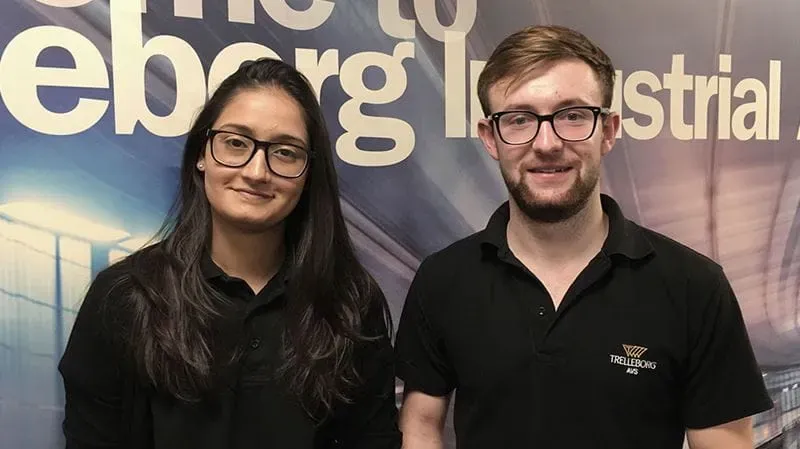Closing the skills gap - Trelleborg Antivibration Solutions

line-height:150%;font-family:"Arial",sans-serif">Closing the Engineering Skills
Gap – Despatch from the Front Line</span></strong><span lang="EN-GB" style="font-size:14.0pt;mso-bidi-font-size:10.0pt;line-height:150%;font-family:
"Arial",sans-serif;font-weight:normal;mso-bidi-font-weight:bold"><o:p></o:p></span></h1>
It has long been known the importance engineering plays in the economic growth of the UK. As a country, Britain is renowned around the world for its engineering expertise and conquests, contributing at least £280 billion to the UK economy. However, the well-documented engineering skills gap is threatening this prestige, demand is ever growing and reports only point to the trend continuing in the future.
To get insider knowledge on what's motivating young people to pursue STEM careers and some of the barriers in place stopping them doing so, we've sat down with two of our apprentices: Manveet Bhandal (MB), Technical Team student and Will Robinson (WR), Materials lab student.
What would you say are the key issues that are hampering the supply of future engineering skills?
WR: “For me, there is a poor perception of engineering among young people and what it actually entails. I think people associate it as either too complicated to pursue or that you will just be working long hours in a factory. A lot of people who start university to do engineering have been set on doing that for ages, not many people are swayed to do it through careers advice and guidance in schools, unlike other academic and career pathways.
MB: “It’s hard to avoid mentioning the male bias in the industry. There are not many females within engineering, so widening participation is definitely a problem and needs to be addressed. Groups are underrepresented, whether that be female, ethnic minorities or low income families, more needs to be done to open up engineering to the masses.”
What made you interested in the profession?
MB: “The challenges and the problem-solving aspects are what attracted me to the career path. You get faced with challenges that impact people’s everyday lives and help solve them. This is something I have seen first-hand since I have been on placement at Trelleborg, the anti-vibration technology we provide to the rail industry ensures commuters have a smooth ride to work in the morning. When I get a train now it’s hard to think about the real-world applications engineering improves, without people even knowing about it.
WR: “Well, it’s hard for me to top that answer. It’s the same for me, I have always had a real interest in how things work and like the thought of applying my knowledge to help deliver practical solutions to real world problems.”
How are you finding your placement, and do you think it’s helpful when it comes to helping you decide what path to take after university?
MB: “We have been here for around three months now and it has been great. They really trust you at Trelleborg and want to develop you. You are treated as an employee with real responsibilities and to-do lists, this is very empowering as a placement student.”
WR: “I agree, the variety we can get involved with really helps us develop our skills and knowledge. This is definitely not a placement where they just get you to make the tea, although I do take my turn in the tea rounds, its more than that, it’s a work environment I can put in to practice what I have been learning at university. Everyone is very friendly and supportive as well.”
“Doing a placement has really confirmed to me that I really do want to do engineering after my degree.”
MB: “That’s the thing, it’s one thing studying a subject at university and another doing it in the real world, this placement provides the opportunity to find out whether what you love in theory, is what you love in practice.”
What do you think schools, universities and companies can do to help students pursue careers in engineering?
WR: “I would like to see more guidance and practical support by schools and universities. More activities need to be done at this stage to encourage the next generation of engineers to take up the profession. It would be great to see STEM subjects, set group projects that can bring the profession to life and the impact it can have on the world.”
MB: “It would be great to see the longstanding perception of engineering as manual and a low status vocation compared to others tackled. I think there is a real opportunity to champion the inspirational leaders in engineering, again compared to other leaders you may see in the tech industry they get very little exposure. Even when they are having a similar or greater impact on the world. From having this, I think it would give people at school and university something to aspire to and want to become the next inspirational leader in engineering.”
WR: “Also, doing more to open up the profession to school leavers is a must. As we know more than anyone, it is very expensive to go to university these days and not an option for everyone. More apprenticeships will capture the school leavers who want to take up the profession but don’t want to go through university.”
Thanks, Manveet and Will. To learn more about apprenticeships with Trelleborg click on About Us and then Join the Team.